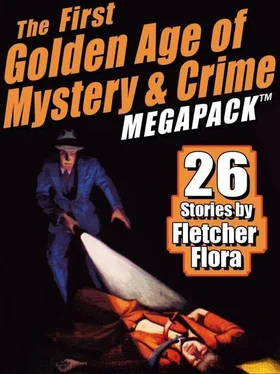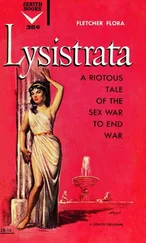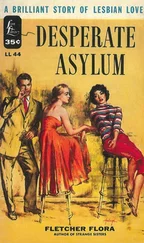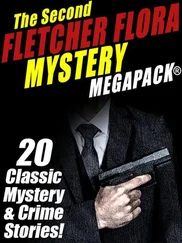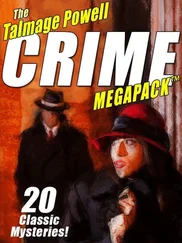Mrs. Dearly, mildly annoyed by the trespasser, got out of the Jaguar and walked around the house to the rear; but there was no sign of Cal or anyone else. She went into the house through the kitchen, and there in the hall which ran forward from the kitchen to the front entrance was a short man in a dark blue suit, a stranger with an odd little potbelly like a melon held in position by his belt; and this man had obviously come out of the living room to meet her, as if he had become, by some strange trickery in her absence, the master of the house and she the stranger.
“Mrs. Dearly?” he said.
“Yes,” she said. “Who are you?”
“My name is Dickson. Police.”
“Police? What on earth are you doing here? Where is my husband?”
“You had better talk with Lieutenant Hardy about that. He’s waiting for you in the living room.”
He half turned and gestured toward a doorway, still with that curious implication of inviting her to be his guest. She walked past him into the living room, where another man was standing in the middle of the room with his back to a bank of windows bright with the late afternoon sun. He was even shorter than the man who had called himself Dickson — a thin, consumptive-looking man of indeterminate age in a wilted seersucker suit.
“Good afternoon, Mrs. Dearly,” he said. His voice was as wilted as his suit, and perfectly supplemented by a languid, hesitant gesture of his right hand, its middle and index fingers stained by the smoke of countless cigarettes. “I’m Lieutenant Hardy. Sorry to intrude.”
The apology was hollow, a mere concession to form. For a moment Mrs. Dearly had a terrifying feeling of helplessness, of being swept into a play of forces she could not control, and at whatever cost she was compelled to assert herself in a way that would restore her position and assurance.
“Your car is blocking the drive,” she said. “Please be good enough to move it.”
“Certainly.” His right hand moved again, seeming to gather in Dickson. “Go move the car, Dickson, and drive Mrs. Dearly’s back to the garage.”
“The key is in the ignition,” Mrs. Dearly said. “Have you ever driven a Jaguar?”
“I’ll figure it out,” Dickson said.
He went out, and Mrs. Dearly turned back to Hardy.
“Perhaps now, Lieutenant, you’ll explain why you are here. And I would like to see my husband, if you don’t mind.”
“I’m afraid that’s impossible. He isn’t here.”
“Where is he? Has something happened to him? Tell me at once.”
“I had hoped to break it to you a little more gently, but I see that I can’t. The fact is, your husband is dead.”
“Dead? Did you say — dead?”
She moved to a chair and sat down with an effect of excessive care, as if moving and sitting had become all of a sudden a precarious business. She sat erect in the chair, her back unsupported, her eyes staring past Hardy through a bright pane of glass behind him into the side yard beyond the drive.
She was oddly sensitive in that moment to the details of sight and sound, and she noticed that the yard had been partly mowed, the power mower standing at rest on the clean line dividing the clipped and shaggy grass. She heard the rich roar, quickly reduced, of the Jaguar in the drive.
“Are you all right?” Hardy said.
“Yes, thank you. I’m quite all right.”
“Would you like me to tell you about it?”
“I think you had better.”
“Well, there isn’t much to tell, when you come right down to it. Our only witness is your neighbor on the west, Mr. Winslow, and he didn’t really see anything much. He was upstairs in a room on the second floor of his house this afternoon about two or two thirty, he couldn’t be exact, and he looked out the window and saw your husband reclining in one of those canvas sling chairs on your rear terrace. He said your husband had been mowing the grass, and Winslow assumed, naturally, that he had merely taken a break to rest and cool off, which was probably true. It’s been a pretty hot day, as you know.
“Anyhow, Winslow happened to look out the window again about twenty minutes later, and your husband was no longer in the sling chair. He was lying on his face on the terrace. Apparently he had stood up, taken a step or two, and collapsed. Winslow was alarmed, as you might expect, and he hurried over. To put it bluntly, if you will excuse me, your husband was dead. Before dying, he had been very ill. To his stomach, I mean.”
Hardy stopped, watching Mrs. Dearly, and Mrs. Dearly continued to stare through the bright glass into the bright yard. Her face in profile was beautiful and composed. It was almost , Hardy thought, serene . Being basically an old-fashioned man, he found an old-fashioned simile in his head: she has a face like a cameo , he thought.
“I’ve warned him and warned him about it,” she said at last.
“About what, Mrs. Dearly?”
“Working so hard in the hot sun. He loved working in the yard, you know, and he insisted on spending practically every week-end at it. Sometimes, whenever he could, week days also. He was getting too old for such work, especially in the hot sun. He had a stroke, I guess. A heat stroke or something. Doesn’t someone with a heat stroke become violently ill to his stomach?”
“I think so. I’m not sure about it.”
“Where is my husband now? His body, I mean. And why are the police involved? Is it normal for the police to be involved in such a matter?”
“We were called by the doctor who was summoned by Mr. Winslow.”
“Why should the doctor call the police?”
“He thought it wise, considering the circumstances of the death. He was not prepared to certify the cause without an autopsy.”
“An autopsy? Is that where Cal is? Have you taken him away somewhere for an autopsy?”
“Yes. Sorry. We tried to locate you, but we couldn’t.”
“Can you perform an autopsy on my husband without my permission?”
“If you want to make an issue of it, we can get an order. But it would be much better if you would simply agree. I don’t see why you shouldn’t.”
“Since you will obviously do it in any event, I might just as well agree. You are right, anyway. There is no reason why I shouldn’t.”
“Thank you. The body will be returned to you as soon as possible.” He paused for a moment, apparently trying to put in order the words to express properly what needed to be said. “I must say that I admire the way you are taking this. I was afraid it might be all ordeal.”
She turned her face toward him then, lighted by the sun on one side and softened by shadows on the other. Her lips assumed the shape of the merest smile.
“I’m not the hysterical type, Lieutenant. I suppose I’m a bit numb, really. I can hardly believe that Cal is dead. It’s often that way when someone dies suddenly, isn’t it? Later it will strike me fully and all at once.”
“Will you be all right here alone? It’s a large house, but apparently there are no servants around.”
“We have a cook and a housekeeper, but they were given the week-end off. Cal and I were on our own for two days.”
“Too bad. If someone had been around, something might have been done in time to save him.”
“Yes. Poor Cal. Dying alone like that. I think, Lieutenant, if you don’t mind, that I would like to go upstairs. Is there anything more you want of me?”
“No. I’m finished here. I can’t tell you how sorry I am that we had to intrude this way.”
“Not at all. Under the circumstances, as you said, there was nothing else you could do.”
“You’re gracious to say so. Goodbye, Mrs. Dearly.”
“Goodbye, Lieutenant. Please find your own way out.”
Читать дальше
